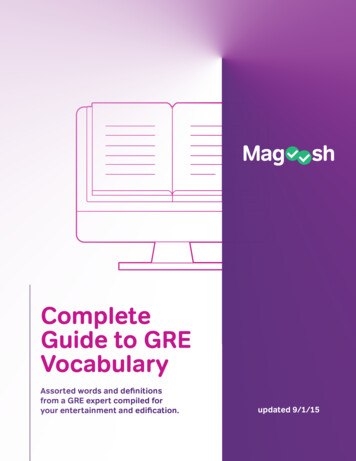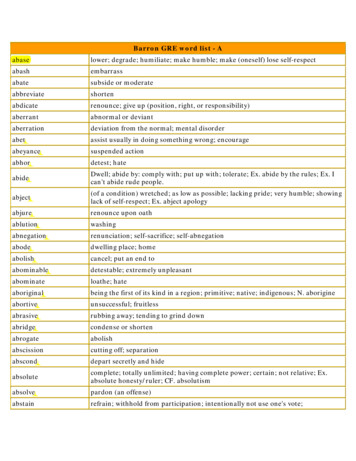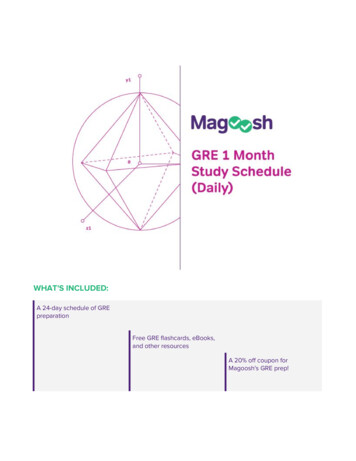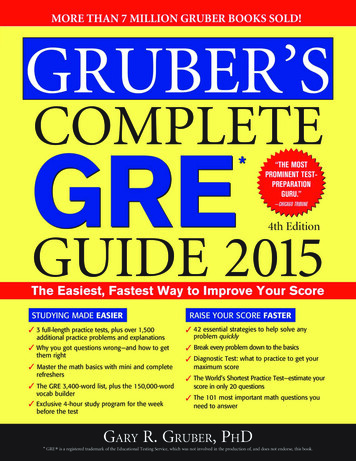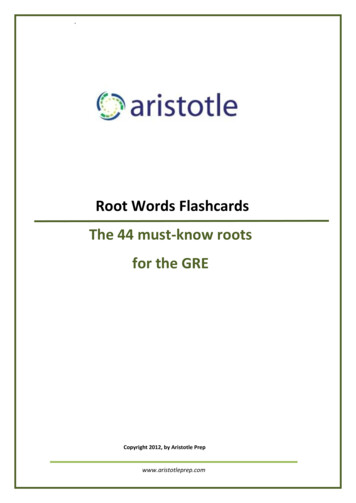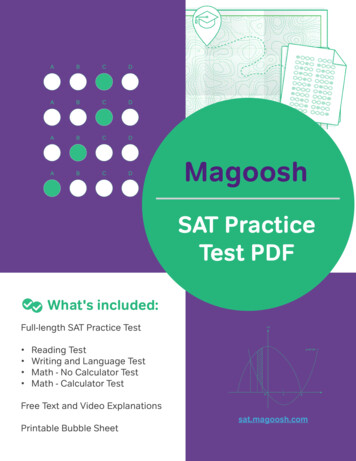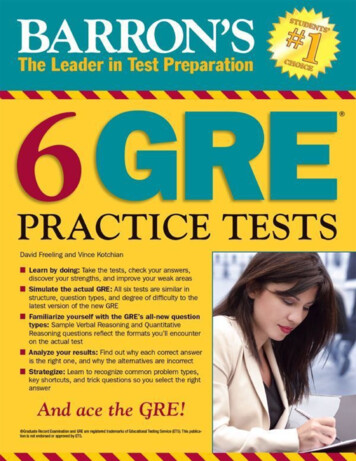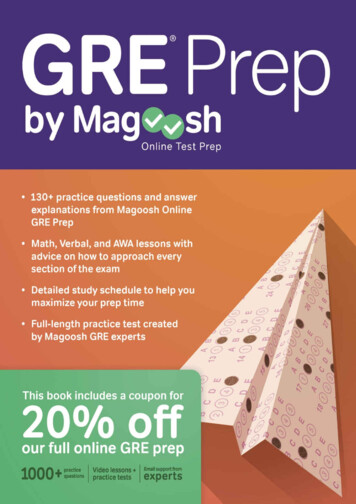
Transcription
RTC TeamPublisher Corey Michael BlakePresident Kristin WestbergEditor Amanda RonanContent Coordinator Christian PanneckDesigners Sunny DiMartino, Christy BuiColoring Page Illustrator Nathan LuethProofreaders Adam Lawrence, Carly CohenProject Manager Leeann SandersFacts Keeper Mike WinicourMagoosh TeamProject Leads Jessica Wan, Maizie SimpsonContent Specialists Chris Lele, Mike McGarryCopy Editors Lucas Fink, Adam LozierStudent Editing Coordinator Anne BercillaProofreaders Peter Poer, Kristin Fracchia, Travis ColemanCover Designer Mark ThomasCopyright 2017 MagooshAll rights reserved. Except as permitted under the US Copyright Act of 1976, no part of thispublication may be reproduced, distributed, or transmitted in any form or by any means, orstored in a database or retrieval system, without the prior written permission of the publisher.Writers of the Round Table PressPO Box 511, Highland Park, IL 60035www.roundtablecompanies.comPrinted in the United States of AmericaFirst Edition: January 201710 9 8 7 6 5 4 3 2 1Library of Congress Cataloging-in-Publication DataMagoosh.GRE prep by magoosh / Magoosh.—1st ed. p. cm.
ISBN Paperback: 978-1-939418-91-3ISBN Digital: 978-1-939418-92-0Library of Congress Control Number: 2016961821RTC Publishing is an imprint of Writers of the Round Table, Inc. Writers of the Round Table Press and the RTCPublishing logo are trademarks of Writers of the Round Table, Inc.GRE , TOEFL , and Praxis are registered trademarks of Educational Testing Service (ETS). This workbook is notendorsed or approved by ETS nor any of the following trademark holders:ACT is a registered trademark of ACT, Inc.GMAT is a registered trademark of the Graduate Management Admission Council (GMAC).LSAT is a registered trademark of the Law School Admission Council, Inc.MCAT is a registered trademark of the Association of American Medical Colleges.SAT is a registered trademark of the College Board.
ContentsHi there!Meet MagooshChapter 1: Meet the GREChapter 2: How to Study1-Month GRE Study ScheduleChapter 3: GRE Quantitative ReasoningMeet the GRE Quantitative SectionQuantitative Question TypesQuantitative Concept #1: Fractions/Ratios/PercentsFractions/Ratios/Percents Practice QuestionsFractions/Ratios/Percents Answers and ExplanationsQuantitative Concept #2: Integer Properties and Number SenseInteger Properties and Number Sense Practice QuestionsInteger Properties and Number Sense Answers and ExplanationsQuantitative Concept #3: AlgebraAlgebra Practice QuestionsAlgebra Answers and ExplanationsQuantitative Concept #4: Exponents and RootsExponents and Roots Practice QuestionsExponents and Roots Answers and ExplanationsQuantitative Concept #5: Word Problems and StatisticsWord Problems and Statistics Practice QuestionsWord Problems and Statistics Answers and ExplanationsQuantitative Concept #6: GeometryGeometry Practice QuestionsGeometry Answers and ExplanationsQuantitative Concept #7: Counting and ProbabilityCounting and Probability Practice QuestionsCounting and Probability Answers and ExplanationsQuantitative Concept #8: Data InterpretationData Interpretation Practice QuestionsData Interpretation Answers and ExplanationsQuantitative Concept #9: Quantitative Comparison Strategies
Quantitative Comparison Practice QuestionsQuantitative Comparison Answers and ExplanationsMath Fact and Formula Cheat SheetChapter 4: GRE Verbal ReasoningMeet the GRE Verbal SectionVerbal Question TypesVocabulary on the GREFlashcardsVerbal Question Types: Text CompletionText Completion Practice QuestionsText Completion Answers and ExplanationsVerbal Question Types: Sentence EquivalenceSentence Equivalence Practice QuestionsSentence Equivalence Answers and ExplanationsVerbal Question Types: Reading ComprehensionReading Comprehension Practice QuestionsReading Comprehension Answers and ExplanationsChapter 5: GRE Analytical Writing AssessmentMeet the GRE AWAThe Issue TaskThe Argument TaskPractice Writing TasksChapter 6: GRE Practice TestGRE Practice Test QuestionsGRE Analytical WritingGRE Quantitative Section 1GRE Verbal Section 1GRE Quantitative Section 2GRE Verbal Section 2Answer KeyGRE Practice Test ExplanationsGRE Analytical Writing AssessmentGRE Quantitative Section 1 Answers and ExplanationsGRE Verbal Section 1 Answers and ExplanationsGRE Quantitative Section 2 Answers and Explanations
GRE Verbal Section 2 Answers and ExplanationsOff to the Test!Appendix: Magoosh Vocabulary Word Lists
Hi there!First, we want to take this opportunity to thank you for checking out this bookby Magoosh. You’ll soon discover that the content of these pages, combinedwith our online product, packs a gigantic GRE-prep wallop.You see, what you’re holding in your hands is a companion guide for theMagoosh GRE-prep program offered online at magoosh.com. You’re notgoing to find thousands of practice questions in these pages. Instead, you’regoing to find two hundred of the highest-quality, best-explained, and mostrobust questions that have helped thousands of students succeed on the actualGRE. On top of the thorough explanations and step-by-step directions, werank the difficulty level of each question and tell you what percentage of ouronline students answered the question (or one like it) correctly. These stats arethere to help you size up each question before you dive in. You can use themto figure out what actually makes a question easy, medium, or hard. Getting afeel for the difficulty level of the questions on the GRE will help youapproach the test with more confidence. “Look at that,” you’ll say to yourself.“I just sailed through a hard question like it was no big deal!”With the help of this book and all the useful features in Magoosh online,you’ll rock the GRE.That’s because the preparation you do with Magoosh online mimics thereal experience of a computer-based test like the GRE. You’ll have all thetools you need and know what to expect when you sit down to take the realtest. In addition to the thousand-plus practice questions online, we alsoprovide a text explanation and a video explanation for every question. Yes,every single one. And we don’t just offer practice questions. To help youcover the basics, we also provide more than two hundred video lessons thatcover every topic on the test.We hope you’re getting the sense that we really care about your success,because we do. That’s where this book comes in. We started wondering howwe could help you study even more efficiently for the GRE and figured thatan actual book might come in handy. Sometimes books can go places laptopscan’t. You can toss this book in your bag and study whenever you findyourself lacking an Internet connection, wanting to review handwritten notes,or feeling like you might learn something better from a physical book. Thisbook extends the Magoosh content to help keep you studying whenever andwherever it’s convenient.Magoosh isn’t just about practice questions and tests, though. We also
have a free blog (magoosh.com/gre) full of great study tips and other info. Infact, we’ve used some of our most popular posts to help write this book. Inaddition, you’ll find free math and vocabulary flashcards in the iOS andGoogle Play app stores. You can flip through these online resources wheneveryou have a few free minutes.We hope you find this book useful, and we would love to hear yourfeedback. If you have any questions, comments, or want to send a virtual highfive, get in touch with us at book@magoosh.com. Happy studying!All the best,The Magoosh Team
Meet MagooshThe TeamWe at Magoosh are a bunch of education nerds who get super stoked abouthelping students achieve their academic dreams.This is Bhavin Parikh, our CEO and founder. He has a BS/BA in economicsand computer science from Duke University and an MBA from the HaasSchool of Business at University of California, Berkeley. Now, he’s on amission to change the way people learn and how they think about learning,which is why he started Magoosh in 2009. Fun fact: when he’s not hard atwork with our team, you’ll usually find Bhavin playing ultimate Frisbee orSmash Bros.And here’s the rest of the fantastic Magoosh team!
The Magoosh ExpertsLearn more about the Magoosh test-prep experts who helped write this book!All the tips, tricks, and lessons you’re about to read came from the minds ofthese two instructors. If you have any questions for them, send an email tobook@magoosh.com. We’re always happy to speak with students!Chris LeleGRE and SAT Curriculum Manager at MagooshChris is the GRE and SAT curriculum manager (and vocabulary wizard) atMagoosh Online Test Prep. In his time at Magoosh, he has inspired countlessstudents across the globe, turning what is otherwise a daunting experienceinto an opportunity for learning, growth, and fun. Some of his students haveeven gone on to get near perfect scores. Chris is also very popular on theinternet. His GRE channel on YouTube has over eight million views.
Mike McGarryGMAT Curriculum Manager at MagooshMike wrote the GRE Quantitative chapter of this book. At Magoosh, hecreates expert lessons and practice questions to guide GRE and GMATstudents to success. He has a BS in physics and an MA in religion, both fromHarvard, and over twenty years of teaching experience, specializing in math,science, and standardized exams. Mike likes smashing foosballs into orbit,and despite having no obvious cranial deficiency, he insists on rooting for theNY Mets.
Our MissionWe create products that give students everywhere access to enjoyable,affordable, and effective test prep.Our Core ValuesWe want to share these with you so you know what we’re all about.Accessible ExclusiveWe’re open to ideas from everyone, inside andoutside of Magoosh.Challenge ComfortWe challenge ourselves to learn new skills bytackling tasks we’ve never done before.Friendly FormalWe always show respect and kindness to ourteammates, customers, and partners, whetheronline or offline.Wow ProfitWe go above and beyond in our work and neversay, “It’s not my job.”Done PerfectWe have a bias toward action and won’t delay forperfection tomorrow what can be done today.Data IntuitionWe run experiments to test ideas and gather data.Passion [Something]We love what we do! Helping students is too muchfun to be considered work.Communication EfficiencyWe set clear expectations, communicate whenwe’ve completed a task, and follow up whennecessary.
Change Status QuoWe adapt to difficult situations and reevaluate ourpriorities, so we’ll always be a work in progress.
Our ProductsMagoosh offers test prep for the GRE, GMAT, LSAT, SAT, ACT, TOEFL,IELTS, MCAT, and Praxis. And we’re expanding to new tests soon!Magoosh GRE OnlineOur premium online product offers:More than two hundred lesson videos on the GRE QuantitativeReasoning, GRE Verbal Reasoning, and GRE Analytical WritingAssessment (AWA) categories—that’s about twenty hours of video!More than one thousand GRE Quantitative and GRE Verbal practicequestions, with video explanations after every questionMaterial created by expert tutors who have in-depth knowledge of theGREEmail support from our expert tutorsCustomizable practice sessions and mock testsPersonalized statistics based on performanceAccess anytime, anywhere from an Internet-connected deviceWhen you sign up for the premium product, you can access all your stats atany time. This is what the Magoosh dashboard looks like:
What Students Say about MagooshWe’re your biggest fans when it comes to your GRE studies. And our supportdoesn’t go unnoticed. Check out what some of our current and formerstudents have said about us below and on magoosh.com/stories andgre.magoosh.com/testimonials.Additional Resources from MagooshIn addition to this book and our full online GRE prep, we offer many otherresources (yes, even more!) to help you get the most out of your GRE prepjourney.
Magoosh GRE study plans: Whether you have one, three, or sixmonths to study, we’ve created these daily and weekly guides to tell youexactly what and when you should study so that you’ll be fully preparedfor test day. Find all of the guides by visiting this page Magoosh GRE apps for iOS and Android:Magoosh Prep: Practice GRE Quantitative, GRE Verbal, andGRE AWA on the go.GRE Vocabulary Flashcards from Magoosh: Quizyourself every day with these flashcards to learn the 1200 mostimportant words on the GRE. You’ll master different tiers ofvocab difficulty and unlock new levels along the way. Play anopponent for an extra challenge!Magoosh GRE Blog: Visit magoosh.com/gre for tips and advice fromour test-prep experts on how to prepare for test day and dominate theexam.Magoosh GRE eBooks:The Ultimate GRE Guide (magoosh.com/gre/ultimate-greguide)GRE Vocabulary eBook (magoosh.com/gre/2012/grevocabulary-ebook)GRE Vocabulary Flashcards (magoosh.com/gre/2013/grevocabulary-flashcards)GRE Math Formula eBook h GRE YouTube channel: Learn from our expert tutor ChrisLele, whose “Vocab Wednesday” videos walk you through some of thetrickiest vocabulary you’ll see on the GRE.Magoosh GRE forum (official questions and explanations): Onthis page, you’ll find links to all of Magoosh’s video explanations forofficial GRE material. You can leave responses to questions or upvoteanswers that you find particularly helpful. (gre.magoosh.com/forum)
Chapter 1Meet the GREThe Test BreakdownThe sectionsThe GRE consists of two Quantitative Reasoning sections, two VerbalReasoning sections, and one experimental section, which can be either Verbalor Quantitative. In addition, there are two timed essay-writing assignments inthe Analytical Writing Assessment (AWA) section of the GRE. Theexperimental section won’t count toward your score, but you won’t knowwhich section is the experimental one. You should treat all sections likethey’re the real deal. Both the overall GRE Verbal and GRE Quantitativescores can range from 130 to 170. The essays are scored from 0 to 6 in halfpoint increments.Number of questions and time limitThe GRE Quantitative sections contain twenty questions each. You’ll begiven thirty-five minutes to complete each section. The Verbal sections alsoconsist of twenty questions each, but you’ll have just thirty minutes tocomplete those sections.GRE Quantitative overviewThe two sections in this category are made up of approximately sevenquantitative comparison questions and thirteen non–quantitative comparisonquestions (don’t worry, we’ll explain comparison and non-comparisonquestions soon). Possible question types include the following (these fourexample practice questions will be explained starting on page 35; no need toworry about solving them now!):Multiple choice: a standard question type in which you just have toidentify the one correct answer.Which of the following equations is true for all positive valuesof x and y?
Multiple answer: a question type that can have up to ten answerchoices; you’ll have to “select all that apply,” which means that thenumber of correct answers isn’t provided.2x2 6 40Which values of x satisfy the inequality above?Indicate all such values.–8–6–4–22468Numeric entry: an open-ended question type in which you’ll have totype in the correct value.Two trains starting from cities 300 miles apart head in oppositedirections at rates of 70 mph and 50 mph, respectively. Howlong does it take the trains to cross paths?Quantitative comparison: a question type that lists two quantities and
asks you to compare them and select one of the following: A is equal to B,A is greater than B, A is less than B, or the relationship between the twoquantities cannot be determined from the information given.Column AColumn BThe number of positivemultiples of 49 less than2000The number of positivemultiples of 50 less than orequal to 2000The quantity in Column A is greaterThe quantity in Column B is greaterThe two quantities are equalThe relationship cannot be determined from theinformation givenFor more information on question types, see the information in chapter 3.Also, don’t forget that there’s a basic on-screen calculator that you’ll haveaccess to while completing the GRE Quantitative sections! See page 33.GRE Verbal overviewThe two sections in this category are each made up of about six textcompletion questions, four sentence equivalence questions, and ten readingcomprehension questions.Text completion: questions that can have one to three blanks and rangefrom short sentences to four-sentence paragraphs. For double- and tripleblank text completion questions, you must answer each blank correctly toreceive full points—there’s no partial credit!Sentence equivalence: questions that have six possible answerchoices. For every sentence equivalence question, there will be twocorrect answers. To receive any credit, you must choose both correctanswers.Reading comprehension: passages that range from twelve to sixtylines. Topic matter is usually academic in nature and covers areas such asscience, literature, and the social sciences. Question types include
standard multiple-choice questions, highlight-the-passage questions, andmultiple-answer questions, which require you to choose any number ofthree possible answer choices.GRE AWA overviewAt the beginning of your GRE, you’ll have to write two essays: the Issue taskand the Argument task. The essays are timed at thirty minutes each. Neither ispart of your 130–170 score. Each essay receives a score ranging from 0 to 6.Your final essay score is the average of both essay scores.How Is the GRE Scored?The GRE scale may seem pretty arbitrary. After all, who has ever seen a testgraded on a 130–170 scale? A range of 0–100, yes, but 130–170? Weird!Well, according to ETS, when they revised the GRE scoring back in 2011,they wanted to stick to three digits so that schools wouldn’t have to overhaulall the textbox entries that call for that specific number of digits. Fair enough.Also, to avoid confusion, ETS made sure the current scoring system didn’toverlap numbers with the old GRE scoring system.The GRE scoring system makes up for the limited range (just 40 points!)by giving more significance to the extreme ends of the scale. For example, onthe GRE, the difference between a score of 165 and a score of 170 will be thedifference between being in the 96th percentile and being in the 99thpercentile.At the end of the day, you’re not going to be tested on these statisticalnuances. The important thing to remember is that many admissions officesbase their evaluations on a percentile score, which you’ll also receive as partof your score report.Questions are static, but the GRE is adaptiveThe GRE is adaptive, but not in the way some other tests are. Many tests(such as the GMAT, for instance) will adapt to your proficiency level. Themore questions you get right, the harder they’ll get; if you get more questionswrong, they’ll get easier and easier. The GRE isn’t adaptive in this way.Question difficulty within a section doesn’t change depending on whether youanswer questions correctly. However, your performance on the first GREVerbal and Quantitative sections will determine whether the next sections ofthe same type are easier or more difficult than the first.Questions have random levels of difficulty
Questions might be static, but that doesn’t mean a section can’t becomeprogressively harder or easier, theoretically. There is no order of difficulty onthe GRE. The first question can be the hardest and the last question theeasiest.Each question is weighted the sameEach question is basically weighted the same. So the question that seems likeit will take fifteen minutes to answer is worth the same as the question youcan answer in fifteen seconds.How Difficult Is the GRE?Simply put, the GRE can be a very difficult test, especially if you’ve been outof school for a while. Typically, this tends to hold truer for the GREQuantitative than for the GRE Verbal or AWA. So let’s break it down bycategory.How hard is GRE Quantitative?The truth is, as soon as you leave college, the likelihood of using mathdiminishes drastically. Compounding the “rusty math-brain syndrome” is thefact that GRE math is different from the math you probably did in college; it’smuch closer to the math you did in your junior year of high school. That’s notto say it’s easy. It’s generally much trickier than anything you ever saw inyour algebra class. Throw in the high-pressure testing environment, and it’sunderstandable why the mere mention of GRE prep can fill a student withutter dread.How hard is GRE Verbal?Believe it or not, as you read more and are exposed to different kinds of text,the parts of your brain that are wired for reading and language skills willcontinue to expand. Of course, knowing your brain is getting better probablydoesn’t help you feel better about facing a four-hundred-word passage onuser-experience design theories or a text completion task that asks you todistinguish between extenuating and corroborating. The simple fact is that theGRE Verbal is very hard, even for PhD candidates. The writing is dense andstylistic; the vocabulary is esoteric and daunting.How hard is GRE AWA?The real difficulty of the GRE writing section stems from rusty writing skills.
For many students, it has been years—or even decades—since they last wrotea five-paragraph essay. Whether you fall into that group or not, trying to scorea “6” is hard, even for confident writers.Don’t worry!With lots of study, you can still do very well on the GRE! Remember, it’s atest that puts you in competition with others. You don’t have to answer everyquestion correctly to score well. Another way of looking at it is this: just asyou struggle on a very difficult three-blank text completion or a probabilityquestion involving the combinations formula, so do 99 percent of the otherstudents taking the test.Don’t forget to do the following:Give yourself plenty of time to prep.Learn how to take the GRE (you’re already doing that by reading thisbook and using Magoosh online!).Believe that improvement will come gradually. At times you mayplateau. So be patient.Performance Statistics on the GRE revised General WritingNumber of Test dardDeviation890.951% female, 43% male(6% did not providetheir gender)Data source: ETS.orgIs the GRE Important?This is a very interesting question, and one that even we at Magoosh debateinternally. Some people think it’s not important at all and that it’s just anarbitrary test that attempts to measure IQ. On the other hand, some peoplethink the GRE is a valid measure of the intellectual skills required for successin grad school.
Ultimately, since much of the reading in the test itself is lifted fromacademic journals, being able to understand such writing will make adifference in grad school. The math sections may not be as defensible,especially for someone looking to write his or her dissertation on motifs offifteenth-century frescoes. At the same time, though, the math found on thetest isn’t that “mathy”—it’s more a test of your logical reasoning withnumbers, which, especially for the majority of you who will have to dabble inthe statistics side of things, is somewhat relevant. Then there’s the GREAWA, which tests your ability to write competently about complex issues—maybe not so useful to engineers, but not totally irrelevant to students whohope to have their work published in academic journals.For now, the GRE is important in that it’s a piece of an application—though only a relatively small one—that gives grad school admissionsofficers a somewhat accurate sense of an applicant’s intellectual ability in ahighly artificial—and stressful—environment. That said, relevant workexperience, excellent letters of recommendation, and a strong undergraduateGPA can strengthen a weak score, just as a lack of any related experience or aterrible undergraduate GPA can neutralize a perfect score.
Chapter 2How to StudyWhether you’re taking the GRE for the first or the fifteenth time, you’ll needto come up with a plan of action when it comes to studying. You know yourschedule, attention span, strengths, weaknesses, and study habits better thananyone else. To complement, in this chapter, we offer all kinds of studyrelated tips, tricks, and thoughts, from a sample study schedule to time-savingtips to morale-boosting reminders. We want you to know that you’re notgoing this alone. We at Magoosh will have your back the whole way.Find the Time to StudyPossibly the most challenging aspect of preparing for the GRE is exercisingthe self-discipline to study for it in the first place. Many people convincethemselves that it will be impossible to carve out any time to study whileworking a full-time job and maintaining some type of work-life balance, sothey don’t even try. But, as it turns out, they’re wrong about there being solittle time. According to a study by the Bureau of Labor Statistics, workingadults in the US have on average approximately four and a half hours ofleisure time each day. The trick to excelling on the GRE is to leverage the freetime you do have and use time-management techniques that work for you.Here are some ideas on how to do just that:1. Take public transportation. If you have the option to use publictransportation to commute to and from work, take it. Yes, it maymake your commute longer and it may be a little inconvenient.However, it will provide you with a routine study time where thereare few distractions. When you’re sitting on the metro, subway, orbus, there’s nothing better to do than study, so take advantage of thisalone time. An added bonus? By taking public transportation, youavoid the frustration of driving in traffic, save gas, and avoid wearand tear on your car.2. Study on the go—always. Download our flashcard apps or keepa set of flashcards in your purse or backpack so you can studywhenever you happen to have a spare minute. If you’re an auditorylearner, you can listen to recordings of vocabulary words. Anotheroption is to use a study app on your smartphone. For example, theMagoosh GRE app provides convenient access to video lessons that
can help you prepare. Whether you prefer to use an app, flashcards,or audio recordings, the key is to take advantage of any opportunityto incorporate more studying into your day.3. Spend an extra hour at work. Consider arriving at work an hourearlier or staying there an hour later so you can study for the GRE.Why should you do it at work? Some people are too distracted athome, and if that’s you, it may be better to either study at your deskor in a conference room—especially if the building is nice and quietbefore and after business hours.4. Study at your peak focusing hours. Some people study betterin the morning, while others are able to focus better in the evening orat night. You know yourself and your strengths and weaknessesbetter than anyone else.5. Schedule the exam. Once you’ve decided to take the GRE, take apractice test to gauge how much you need to increase your score.Then, schedule the exam and give yourself approximately twelveweeks or so to prepare. If you need to increase your scoredramatically, you may want to allow even more time than that—twenty weeks out might be a better target date. It may seempremature to schedule the exam before you’ve even started studyingfor it, but this is actually a great motivator. Once you’ve registeredand paid for the exam, you’re more likely to take it seriously. Byregistering, you’ve moved your “one day” or “someday” to adefinitive date.Preparing for the GRE is a time-consuming task. However, it’s also one of thebest ways to prepare for graduate school and kick-start your study habits.Whether you’re considering a full-time, part-time, or online master’sprogram, carving out a set study time for the GRE will also help you developa study regimen that will benefit you in graduate school.Good, You Got It WrongFor some students, getting answers wrong can be interpreted too easily assome kind of negative personal message (e.g., “I’m dumb,” “There’ssomething wrong with me,” etc.), and it becomes a negative and frustratingexperience.But here’s a different perspective about mistakes. Every mistake, everywrong answer, is an opportunity for growth and self-improvement. The trulyexcellent student lives by this very high standard: absolutely never make the
same mistake twice. That requires incredible perseverance, but even fallingshort of that, each wrong answer is a chance to improve and clarify somenecessary concept about which you previously were unclear or confused.Think of how grateful you would be if, before some important event, youhappened to walk by a mirror and notice you had something smudged acrossyour face. Now you can wipe that smudge off and improve your appearancebefore the important event. Metaphorically, every question you get wrong issuch a mirror—a chance to look at yourself, remove the smudge, and improveyour understanding.Our study plans are designed with this in mind. We have you jump intomixed content questions right away, well before you have a chance tocomplete all the Magoosh video lessons. One reason is, of course, that theGRE itself will throw nothing but mixed content at you, and we want you toget comfortable with this “gear-switching” as early in your study process aspossible. That being said, we know this means you’ll probably get manyquestions wrong at the beginning, and we believe this is a good thing.Obviously, we aren’t trying to punish you or make you feel bad aboutyourself. Rather, we know that making mistakes and consciously reflecting onthese mistakes is exactly what will prime your mind for the content of thevideo lessons.It takes a good deal of confidence and emotional security to adopt thisattitude—to look beyond the frustration of ge
First, we want to take this opportunity to thank you for checking out this book by Magoosh. You’ll soon discover that the content of these pages, combined with our online product, packs a gigantic GRE-prep wallop. You see, what you’re holding in your hands is a companion guide for the Magoosh GRE-pre
